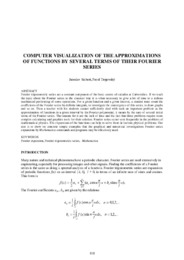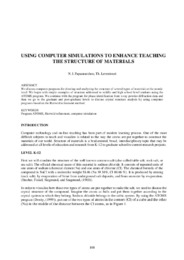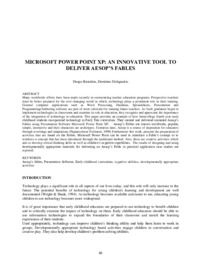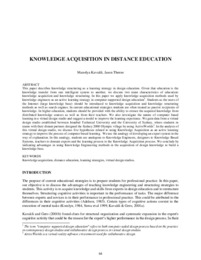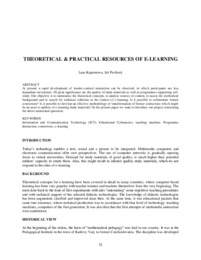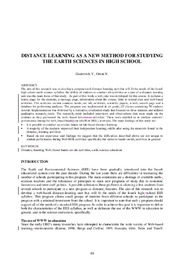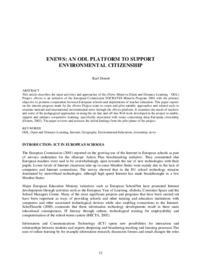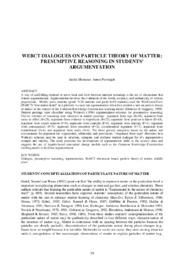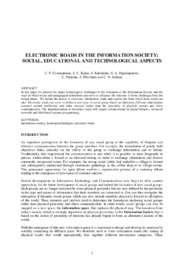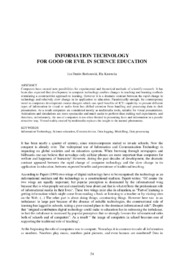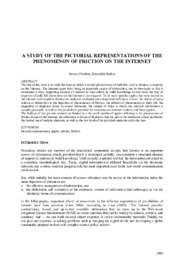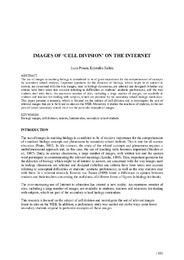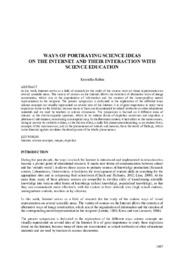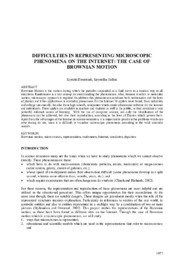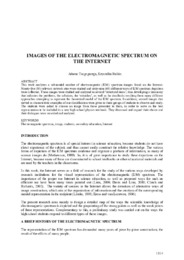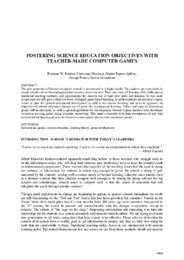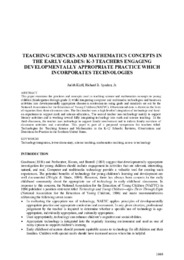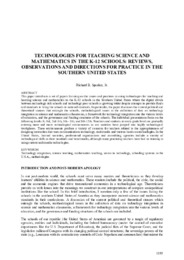ΕΝΔΟ - Ενδοπανεπιστημιακή ερευνητική παραγωγή Πανεπιστημίου Κύπρου: Recent submissions
Now showing items 181-200 of 608
-
Computer visualization of the approximations of functions by several terms of their Fourier series
(Department of Educational Sciences, University of Cyprus, 2003)Fourier trigonometric series are a constant component of the basic course of calculus at Universities. If we teach the topic about the Fourier series in the classical way it is often necessary to give a lot of time to a ... -
Using computer simulations to enhance teaching the structure of materials
(Department of Educational Sciences, University of Cyprus, 2003)We discuss computer programs for drawing and analyzing the structure of several types of materials at the atomic level. We begin with simple examples of structure addressed to middle and high school-level students using ... -
Microsoft power point xp: an innovative tool to deliver Aesop’s fables
(Department of Educational Sciences, University of Cyprus, 2003)Many worldwide efforts have been made recently in restructuring teacher education programs. Prospective teachers must be better prepared for the ever-changing world in which, technology plays a prominent role in their ... -
Knowledge acquisition in distance education
(Department of Educational Sciences, University of Cyprus, 2003)This paper describes knowledge structuring as a learning strategy in design education. Given that education is the knowledge transfer from one intelligent system to another, we discuss two main characteristics of education: ... -
Theoretical & practical resources of e-learning
(Department of Educational Sciences, University of Cyprus, 2003)At present a rapid development of learner-centred instruction can be observed, in which participants are less dependent on teachers. Of great significance are the quality of study materials as well as programmes supporting ... -
Distance learning as a new method for studying the earth sciences in high school
(Department of Educational Sciences, University of Cyprus, 2003)The aim of this research was to develop a computerized distance-learning unit that will fit the needs of the Israeli high-school earth-science syllabus. the ability of students to conduct lab-activities as a part of a ... -
Sunset project: creation of computer and observational network for student educational research
(Department of Educational Sciences, University of Cyprus, 2003)A pilot project is presented, aimed at creation of an educational network of astronomical observations performed by middle-school, high-school and university students at different geographical latitudes. Project participants ... -
Enews: an odl platform to support environmental citizenship
(Department of Educational Sciences, University of Cyprus, 2003)This article describes the main activities and approaches of the eNews Minerva (Open and Distance Learning - ODL) Project. eNews is an initiative of the European Commission SOCRATES Minerva Program 2001 with the primary ... -
WebCT dialogues on particle theory of matter: presumptive reasoning in students’ argumentation
(Department of Educational Sciences, University of Cyprus, 2003)A way of scaffolding students to move back and forth between multiple meanings is the use of discussions that feature argumentation. Argumentation involves the evaluation of the worth, accuracy, and authenticity of various ... -
Electronic roads in the information society: social, educational and technological aspects
(Department of Educational Sciences, University of Cyprus, 2003)In this paper we present the major technological challenges to the formation of the Information Society and the ways in which social and pedagogical restrictions can serve to influence the outcome of those challenges from ... -
Information technology for good or evil in science education
(Department of Educational Sciences, University of Cyprus, 2003)Computers have created new possibilities for experimental and theoretical methods of scientific research. It has been also expected that development in computer technology enables changes in teaching and learning methods ... -
A study of the pictorial representations of the phenomenon of friction on the internet
(Department of Educational Sciences, University of Cyprus, 2003)Τhe aim of this work is to study the ways in which a natural phenomenon of daily life, such as friction, is depicted on the Internet,. The Internet, apart from being an important source of information, can be developed so ... -
Images of ‘cell division’ on the internet
(Department of Educational Sciences, University of Cyprus, 2003)The use of images in teaching biology is considered to be of great importance for the comprehension of concepts by secondary school students. Important questions for the didactics of biology, which might be of interest to ... -
Ways of portraying science ideas on the internet and their interaction with science education
(Department of Educational Sciences, University of Cyprus, 2003)In this work, Internet serves as a field of research for the study of the various ways of visual representation on several scientific areas. The variety of sources on the Internet allows the detection of alternative ways ... -
Difficulties in representing microscopic phenomena on the internet: the case of brownian motion
(Department of Educational Sciences, University of Cyprus, 2003)Brownian Motion is the motion during which the particles suspended in a fluid move in a random way in all directions. Randomness is a key concept in understanding the phenomenon. Also, because it refers to molecular motion, ... -
Images of the electromagnetic spectrum on the internet
(Department of Educational Sciences, University of Cyprus, 2003)This work analyzes a substantial number of electromagnetic (E/M) spectrum images found on the Internet. Ninety-five (95) relevant network sites were studied and sixty-nine (69) different ways of E/M spectrum depiction were ... -
Fostering science education objectives with teacher-made computer games
(Department of Educational Sciences, University of Cyprus, 2003)The new generation of learners in today's schools is accustomed to a digital world. The students are surrounded by visual stimuli and are becoming proficient in areas not on the test! Their new ways of learning offer ... -
Teaching sciences and mathematics concepts in the early grades: k-3 teachers engaging developmentally appropriate practice which Incorporates technologies
(Department of Educational Sciences, University of Cyprus, 2003)This paper examines the practices and concepts used in teaching science and mathematics concepts to young children (kindergarten through grade 3) while integrating computer and multimedia technologies and hands-on activities ... -
Crafting the technological solutions in high school science and mathematic teaching and learning: matthew effects and the digital divide
(Department of Educational Sciences, University of Cyprus, 2003)This paper examines the practices and concepts used in teaching high school science and mathematics concepts (grade 9 - 12) which integrate computer and multimedia technologies and hands-on activities into disciplinebased ... -
Technologies for teaching science and Mathematics in the k-12 schools: reviews, observations and directions for practice in the southern united states
(Department of Educational Sciences, University of Cyprus, 2003)This paper introduces a set of papers focusing on the issues and practices in using technologies for teaching and learning science and mathematics in the K-12 schools in the Southern United States where the digital divide ...
